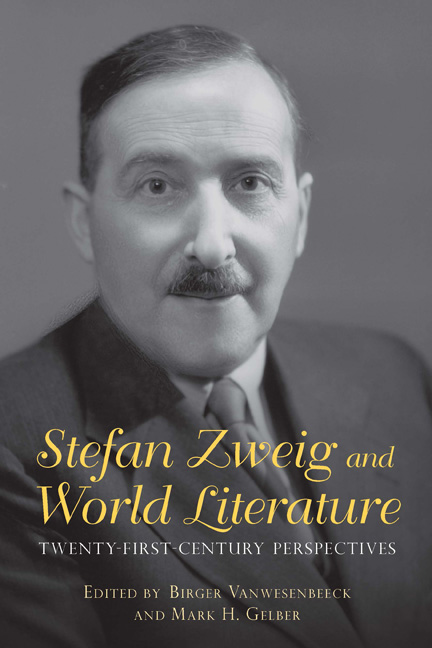Book contents
- Frontmatter
- Dedication
- Contents
- List of Illustrations
- Acknowledgments
- Introduction
- Part I Reception
- Part II Drama and Fiction
- Part III Criticism and Essays
- 5 Stefan Zweig and the Concept of World Literature
- 6 Landscape, “Heimat,” and Artistic Production: Stefan Zweig's Introduction to E. M. Lilien: Sein Werk
- 7 Stefan Zweig's Non-fictional Prose in Exile: Mastery of the European Genre of “Kunstprosa”
- Part IV Politics and Exile
- Notes on the Contributors
- Index
5 - Stefan Zweig and the Concept of World Literature
from Part III - Criticism and Essays
Published online by Cambridge University Press: 05 May 2015
- Frontmatter
- Dedication
- Contents
- List of Illustrations
- Acknowledgments
- Introduction
- Part I Reception
- Part II Drama and Fiction
- Part III Criticism and Essays
- 5 Stefan Zweig and the Concept of World Literature
- 6 Landscape, “Heimat,” and Artistic Production: Stefan Zweig's Introduction to E. M. Lilien: Sein Werk
- 7 Stefan Zweig's Non-fictional Prose in Exile: Mastery of the European Genre of “Kunstprosa”
- Part IV Politics and Exile
- Notes on the Contributors
- Index
Summary
The gap in time between stefan zweig's 1942 suicide and the present provides us with the possibility of attaining a fair vantage point for an assessment of his contribution to “world literature.” Before doing so, however, it will be important to delimit a workable concept of world literature which can be utilized for this analysis. In the first part, which is the bulk of this essay, it is important to describe and measure Zweig's contribution to world literature as it was registered or acknowledged during his lifetime. The time frame extends from the date of his first publications at the end of the nineteenth century, through the interwar years, when he reached the apex of his career as a writer and was celebrated as the most widely read and translated serious German-language author in the world, until his suicide in February 1942 in exile in Brazil. One goal of this essay is to position Zweig within the context of world literature and to assess how important a writer he was during his lifetime within this specific framework. In the second part, which is brief in contrast to the first, a depiction of his place within world literature in the time period after his death is provided. The status and reception of writers are subject to ever-changing constellations of factors which exert an impact on world literature, and Zweig's place or rank invariably changes as critical reflections about his writings and stature negotiate their way through newly emerging and different conceptions of literature and culture.
One factor that renders a fair assessment of Zweig's place within the framework of world literature somewhat problematic is his fluctuating popularity over time and in different places, especially taking into account the dramatic decline in his stature during the last half-century in German-speaking Central Europe and in the Anglo-American literary and cultural world.
- Type
- Chapter
- Information
- Stefan Zweig and World LiteratureTwenty-First Century Perspectives, pp. 93 - 107Publisher: Boydell & BrewerPrint publication year: 2014



